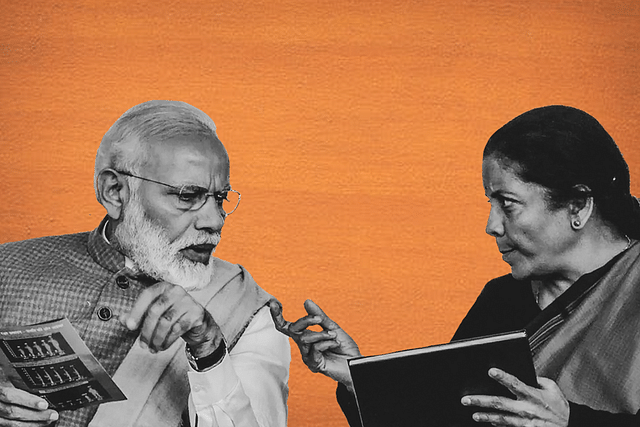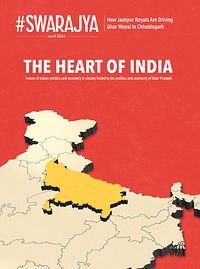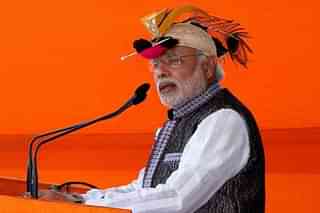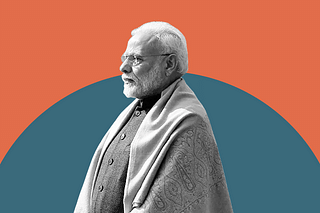Economy
Allowing Private Banks A Good Sliver Of Government Business Hasn’t Come A Day Soon
S Murlidharan
Feb 25, 2021, 05:44 PM | Updated 05:44 PM IST
Save & read from anywhere!
Bookmark stories for easy access on any device or the Swarajya app.

One always tended to associate the government’s banking business with the ubiquitous State Bank of India (SBI) and its affiliates.
That impression was fostered by the fact that it was the first bank to be nationalised way back in 1955 when Imperial Bank morphed into state-owned SBI. In other words, SBI has always been the quintessential public sector bank (PSB).
Even the near wholesale nationalisation of 14 private banks by then prime minister Indira Gandhi in 1969 did not dislodge the SBI from the government’s banker monopolistic role, with SBI managing to elbow out its cohorts in the PSB stable.
The grudging permission to three private sector banks Axis, HDFC and ICICI apart from agency business granted by PSBs to private banks, where the former did not have presence, did serve to disabuse the popular notion that SBI will forever hold sway over government finances in terms of hogging deposits.
The cheer engendered by the 2012 decision to throw open the government business to private banks was short-lived as it was as abruptly withdrawn as it was ushered in. Be that as it may.
So what was sought to be done in 2012 has been done by Finance Minister Nirmala Sitharaman’s announcement on 24 February 2021 — embargo on government business with private bank goes.
More significant is her accent on equal opportunities for all banks, be they in the public or private sector to get government accounts. This points to transparent bidding process that is open to the entire banking sector to bag a government account. This is as it should be.
In a welfare state, the government has a huge footprint in the banking sector not only by way of majority shareholder in PSBs but more importantly as depositor.
Defence personnel pension, EPFO pension, LPG subsidy, tax collections both GST and income tax to name a few, are the schemes that are coveted by banks by their sheer volume even though admittedly the float — the time between deposit and its withdrawal — is sometimes very short. Yet in a volumes game, even a short float can be intelligently exploited by lending in overnight market for example.
In the world of finance, wafer-thin margins need not deter a service provider so long as he is nimble-footed and puts money to best use. Truth be told, what marks a private sector bank from a PSB is its reliance on technology rather than on manpower to enable customers to consummate banking business.
For example, it has been a long standing taxpayers’ complaint that a PSB often sits on the TDS (tax deducted at source) deposited by the tax deductor which results in they not showing up in their 26AS (individual dashboard of all Permanent Account Numbers) thus frustrating claim of proof of payment of tax to that extent. One hopes things will change for the better with the latest decision of the government.
The seminal message that has gone out is the government of the day respects the private sector and it would not allow unnecessary roadblocks to be put up in their growth and survival.
Coming as it does a few days after the Prime Minister’s thumbs up to, and championing of, the private sector in Parliament in the course of his thanks giving reply to the Presidential address, the Finance Minister’s decision is not only a follow up action but a wholesome action in the direction of minimising the role of the government and its agencies through the process of loosening of PSB’s near monopoly.
It is in sync with the government decision announced in the recent budget to privatise two more PSBs this year in addition to IDBI.
The entry of private banks in handling government accounts would come as a whiff of fresh air to both stakeholders, namely the government and the public. The sloth invariably associated with PSBs would be replaced by nimble footedness. Competition keeps one on his toes. Bidding for government accounts would compel banks to shed sloth and flab and deliver on time mainly through embracing state-of-the-art banking software.
S Murlidharan
Save & read from anywhere!
Bookmark stories for easy access on any device or the Swarajya app.
Introducing ElectionsHQ + 50 Ground Reports Project
The 2024 elections might seem easy to guess, but there are some important questions that shouldn't be missed.
Do freebies still sway voters? Do people prioritise infrastructure when voting? How will Punjab vote?
The answers to these questions provide great insights into where we, as a country, are headed in the years to come.
Swarajya is starting a project with an aim to do 50 solid ground stories and a smart commentary service on WhatsApp, a one-of-a-kind. We'd love your support during this election season.
Click below to contribute.





